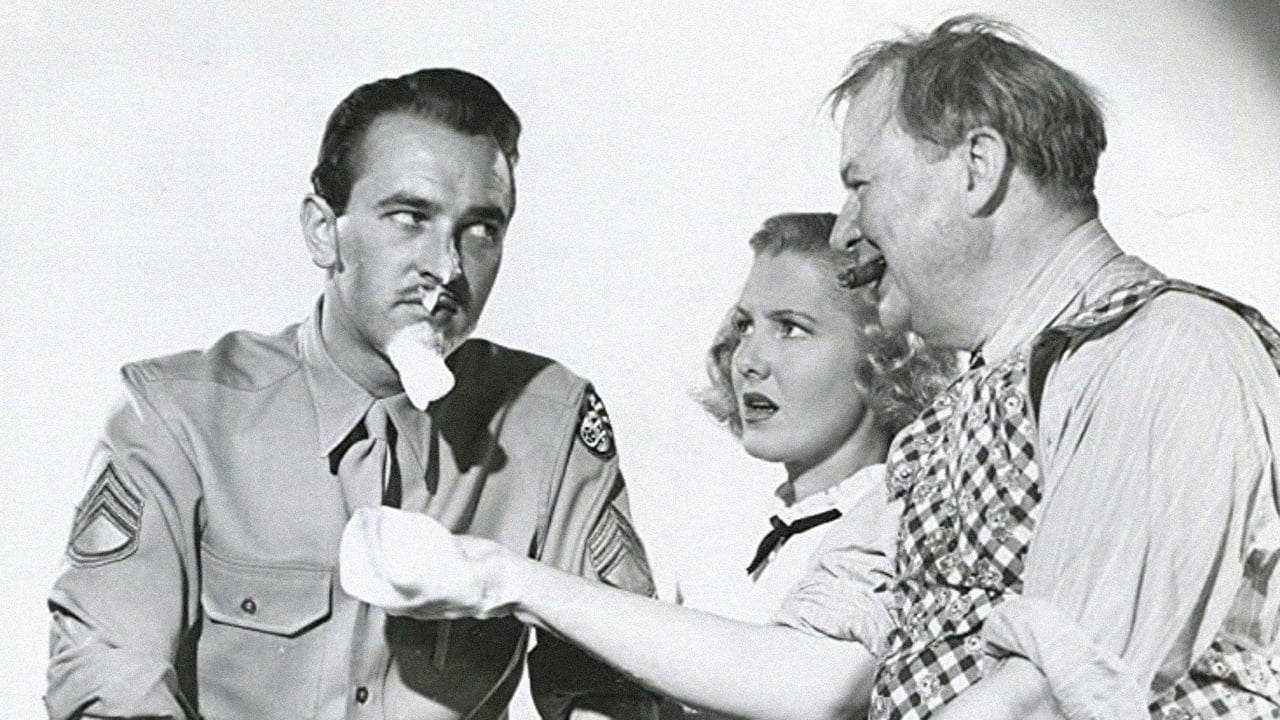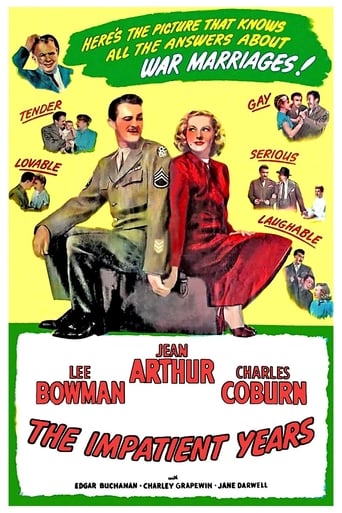

It's fun, it's light, [but] it has a hard time when its tries to get heavy.
... View Morean ambitious but ultimately ineffective debut endeavor.
... View MoreIt's funny, it's tense, it features two great performances from two actors and the director expertly creates a web of odd tension where you actually don't know what is happening for the majority of the run time.
... View MoreWhile it doesn't offer any answers, it both thrills and makes you think.
... View MoreComedy and drama is not a common mix of the silver screen. Probably because it's a tough thing to blend the two and have the end product come out well. Meaning, of course, that it is palatable to the public. When it works, it usually provides a sparkling product. "The Impatient Years" is one such film. It combines comedy and drama with some other genres as well. Wartime romance, love and family are part of this 1944 Paramount film. I couldn't help but think how this film must have struck a chord with some audiences of the day. World War II had been raging for five years, and America's young men had been in the fight nearly three years. Some childhood sweethearts married before the young men went off to war. Many couples met while servicemen were on furlough stateside, and some married during leaves. What must it have been like for those couples on their next meeting, or after the war? "The Impatient Years" looks at that situation and addresses the question with an eye of realism. The screenplay is superb as it combines comedy with the drama. It doesn't dodge the difficulties such couples might encounter. But it uses comedy to lighten some moments. Underneath the surface, little embers of the original romance that led to this union still smolder. We of the audience want to nudge the guy or the girl to make the first move. Finally, a plot to have the couple relive their meeting and whirlwind romance and marriage is the vehicle to ignite the spark of their love. And that happens with absolutely howling humor. Jean Arthur, as Jamie Anderson, shows the range of her talent and acting abilities. She was undoubtedly one of the finest comediennes of the silver screen in the 20th century. Her humor wasn't slapstick, antics or witty dialog. Rather, it was situations. Those involved more ability for acting, and none could do better than Jean Arthur. With mood swings, character changes, facial expressions or changes in voice, Arthur could segue from serious to funny at the drop of a pin. Lee Bowman is a fine match as Staff Sergeant Andy Anderson. Bowman is hardly remembered today. He never rose to the top as a leading man in Hollywood. But for the late 1930s and through the 1940s he had leads in some lesser films and played top supporting roles in some first rate films. In "Impatient Years," he has some of the funniest retorts – all delivered with a straight face or turn away.The supporting cast for this film are all very good. Charles Coburn is wise and funny as Jamie's dad, William Smith. Charley Grapewin and Grant Mitchell are hilarious as the hotel bellboy and clerk, respectively. This movie has a happy ending, and may have been an encouragement for young couples who wed during the war. For audiences far into the future, it's a sentimental and humorous look at a time in history with particular unusual situations in the starting of families. The film doesn't dodge the awkwardness and difficulties of young wartime couples setting up house. And its last half hour has some of the most hilariously funny scenes ever put on film.
... View MoreBased on Jean Arthur's definitive biography, The Actress Nobody Knew, critics, and apparently Oller, did not think much of this film or of Arthur's co-star, Lee Bowman. At the beginning of my foray into classic cinema I would have taken this opinion, and the opinion of other legitimate critics at face value. However, having since discovered many, many underrated gems (and underrated actors) that critics in the past and the present overlook, I decided to watch The Impatient Years and form my own opinion. Jean Arthur is one of my favorite actresses and in "The Impatient Years" (which could also be the title of her fractious tenure at Columbia), she gives one of the best performances of her film career. In contrast to her independent, softly cynical characters of the 1930s, she played slightly befuddled "spinster" roles in the 1940s, but the role of Janie Smith Anderson managed to meld both attributes into an appealing and touching performance. Lee Bowman was equally wonderful in his role as Sgt Andrew Anderson, bringing an assured, low-key type of charm to the screen. I must also praise the supporting cast made up of the fantastic Charles Coburn, and lovely character actors Harry Davenport, Charley Grapewin, Phil Brown, and Grant Mitchell. Clocking in at a well-rounded 90 minutes, "The Impatient Years" is one of those unsung gems full of humor, pathos, and romance, which also takes a good, hard look at the issue of a runaway marriage and the strain of war. I can only imagine how audiences reacted to this film during war-time, and hope that it brought as much joy and entertainment to them as it did for me.
... View MoreWhile I am a huge fan of Jean Arthur's films, this final film from her Columbia Pictures contract is a rather mediocre film--at least compared to her more famous films (which are many). Now this isn't to day it's bad--certainly not. No, it's more just a film with excellent acting but a premise and writing that just don't deliver.Jean and Lee Bowman star as a couple that knew each other only a few days before they married. He then shipped out overseas after only knowing her four days. When he returns, it's now very awkward since they hardly knew each other and it seems that what they do discover about each other they don't like! This is an excellent idea and could be the basis of a good film (sort of like a follow-up to THE CLOCK--an excellent Judy Garland film where she meets and marries a nice guy she hardly knows). However, what happens next is pretty silly and impossible to believe. They decide to divorce and the judge (Edgar Buchanan) decides to follow Jean's father's advice (Charles Coburn) and sentence them to spend four days together re-living the four days they'd previously had--in an effort to get them to realize WHY they married in the first place! This plot device is just silly and impossible to believe. However, if you look past this, the film is amiable enough and entertaining. Not a great flick, but certainly a must for Jean Arthur fans. Also, it is interesting to see Coburn playing a not-so-gruff "nice guy" role for a change. I actually watched the film mostly for him, though I also adore Jean's films.
... View MoreLegendary star Jean Arthur ended her Columbia contract with THE IMPATIENT YEARS in 1944 and walked away from her screen career to return to the movies only twice within the next eight years. This mildly entertaining light drama was not a particularly memorable ending to the golden era of her career but it is an acceptable one. Jean married solider Lee Bowman in a whirlwind courtship before he left for duty, now that he's back they find they have nothing in common except for the baby she gave birth to while he was away. A bad first day back home has the duo headed to divorce court where judge Edgar Buchanan agrees with Jean's dad (Charles Coburn) suggestion that they be forced to relive their whirlwind courtship again for a few days to see if they really don't have anything in common before a divorce will be granted.This is essentially a drama with a few comic touches. Jean Arthur is always good and looks remarkably youthful at 43 (although publicized at the time as 38) completely believable as a young girl who has become completely domesticated without a husband (or really wanting one). Lee Bowman was one of several rather colorless actors promoted to leading man during the war years while many major stars were away serving in the military. He's OK here but not much more than that and is saddled with a character that has a rather unpleasant edge. Certainly the "second courtship" of Arthur and Bowman doesn't ring true in it's resolution.Phil Brown plays Jean's bookish boarder who is half in love with her and has been playing surrogate, platonic husband while Bowman has been away. Brown doesn't make a particularly strong impression on screen but he went on to have a very long if minor career reaching his apex with a small role in 1977 in STAR WARS. He passed away just last year, 2006.Charles Coburn is wasted here but a few other character actors shine in their small roles, notably Charley Grapewin as an elderly bellhop and Harry Davenport and Jane Darwell as the justice of the peace and his wife.THE IMPATIENT YEARS proves at least that Jean Arthur could handle drama as well as her more acclaimed talent for comedy. The star was one of a kind but the film alas is run of the mill.
... View More